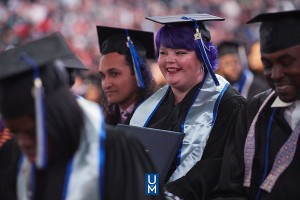
SPONSORED
by Jacqueline Arnold, Director of Strategic Relationships, Saylor Academy, and Tracy Robinson, Director of Academic Innovations, University of Memphis
College degree completion is a major issue for students and families, institutions, and policymakers alike. On average, about 40-50% of first time freshman students do not complete their degree within six years.
Once these students “stop-out”, or leave higher education, they join the 36 million adults nationwide that have some college experience, but no degree or credential to show for their efforts.
Stop-out students are in a peculiar bind economically, mostly unable to reap the benefits of their higher education experience via a higher wage, and saddled with the student debt that comes from their attendance. In fact almost 10% of this group lives under the poverty line, as opposed to less than 5% of college graduates.
It’s like… I finally accomplished something and I feel like different doors will open [for me by] having a degree. I feel like my life is gonna change. I can’t wait...I have been waiting on this for a while.
-- Jessica Roberts, University of Memphis graduate and Finish Line participant
As educators, we’ll need to be even more mindful of disrupted matriculation due to the current pandemic: the displacement of students may lead to a very large cohort of students who decide not to return to the same institution, or even at all, leaving
an unknown number of futures disrupted.
How do we serve these students?
The Finish Line Program at University of Memphis
The University of Memphis piloted the Finish Line program in 2013, as a response to
Tennessee’s “Drive to 55” initiative (to ensure 55% of adult Tenneesans attain a degree by 2025). Finish Line reaches out to students stopped out for at least a semester, with senior standing (90 credits or more) who have a
good academic standing (a GPA of 2.0 or higher), and invites them to return to the university to finish their degrees. So far, Finish Line has helped 713 students return and earn their degrees, and won several awards due to their innovative
outreach efforts.
Finish Line’s results illustrate the relationship between helping stop-outs and ensuring educational equity and access.. The majority of Finish Line students are from an underrepresented group, 71% percent minority students, 68% of students are
low-income, and 48% are first generation. Likewise, nationwide over 50% of African American and Native American students drop-out, compared to 40% of white students. Stop-outs tend to come from underrepresented groups, and targeted outreach, such as Finish Line, helps move forward economic equality for these students and their families.
A free solution to ease financial fears
According to EducationData.org, financial concerns are the top reason students stop out, and financial barriers, such as exhausting financial aid eligibility, prevent students from returning. To counter this, Memphis partnered with Saylor Academy, a nonprofit initiative that offers free online courses, created by university faculty, and designed to follow college-level learning outcomes.
Saylor offers a group of courses that have been reviewed and recommended for college “credit-by-exam” (similar to programs like CLEP) by the American Council on Education, and Saylor partners with universities that accept these recommendations
to offer flexible pathways to degree programs for Saylor students. As a disclosure, Memphis’ faculty independently reviewed a different set of Saylor courses specifically for the needs of their senior students.
Getting near-completers to the “Finish Line”
Once Finish Line students return to the University of Memphis, the students participate in a credit-for-prior-learning process to evaluate their work history, and use Saylor Academy courses to fill in any gaps identified by the University.
Saylor Academy’s self-paced courses help these students (who are now working and supporting families) resume and continue their education as it fits into their lives. With the University of Memphis’s outreach and support, and Saylor
Academy’s free resources, Finish Line has helped 713 students, collectively earning 3,000+ credit hours, like Jessica, change their lives.
Finish Line could be replicated at any university, college, or community college willing to take a deep look at their students and consider creative solutions to financing and support.
Join our webinar on July 22, where Tracy Robinson, Director of Academic Innovations at the University of Memphis, and Jacqueline Arnold, Director of Strategic Relationships at Saylor Academy, discuss what makes this partnership unique in its service to
students.

